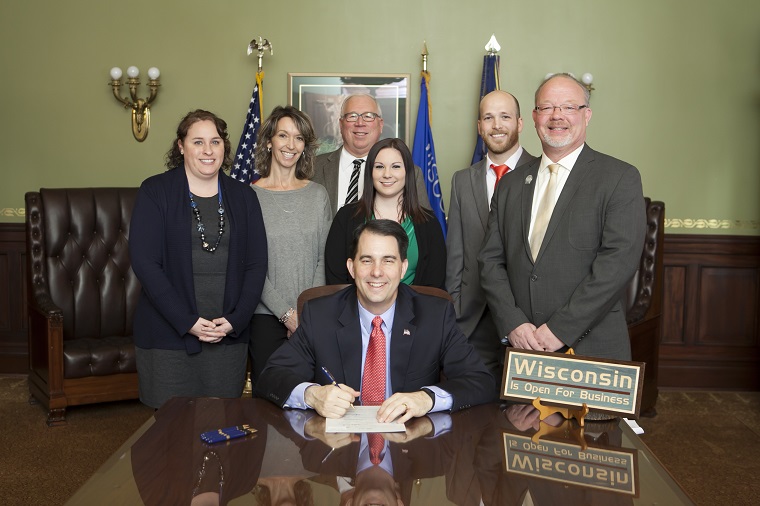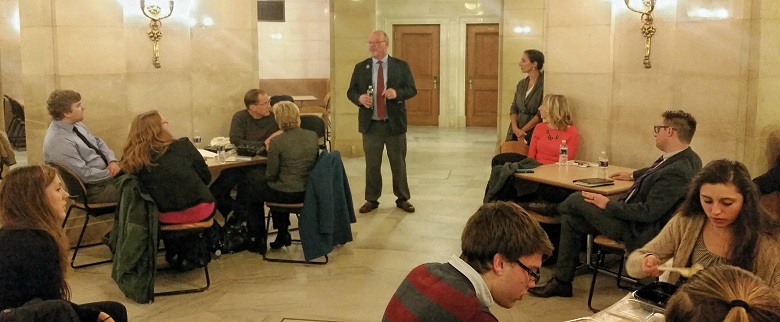One Step
Closer to Becoming Law
This Week in the
Assembly, three of my bills were voted on, passed, and moved one step
closer to becoming state law.
Frank Lloyd Wright
Trail The state Assembly passed
Assembly Bill 512, legislation I authored that will create a trail
through the state, highlighting the architectural works of Wisconsin
native Frank Lloyd Wright. The bill showcases many of the
Wright-designed buildings across the state. The new trail will provide a
clear guide for tourists looking to visit these sites in communities
from Richland County to Kenosha County.
With this bill, Wisconsin can honor one of its most accomplished
residents and invite people from all over the world to enjoy the works
of Frank Lloyd Wright.
The bill designates and marks a specified highway route in the counties
of Kenosha, Racine, Milwaukee, Waukesha, Jefferson, Dane, Iowa, Sauk,
and Richland as the "Frank Lloyd Wright Trail" to identify to motorists
the location of specified buildings designed or constructed by Frank
Lloyd Wright that are open to the public.
I’m excited to have the opportunity to show off these extraordinary
buildings, embedded in the fabric of our communities, to visitors from
across the world. I look forward to welcoming its many visitors to
Wisconsin.
Assembly Bill 357
The second bill of mine that also passed the state Assembly this week is
AB357. This is a bill that will add protections to our state
prosecutors, that mirror those already in place for Wisconsin's
emergency medical technicians, first responders, law enforcement
officers, fire fighters, and someone operating or
staffing an ambulance.
Assembly Bill 595
The third bill I authored that was passed by the Assembly this week is
AB595.
The legislation makes technical changes to current law regarding tax
administration.
Access to Medical Information
for Adoptees Signed Into Law

Last week on February
4th, one of my bills, Assembly Bill 513 was signed into law. Governor
Scott Walker signed into law AB 513,
a bill that helps adoptees make prudent, informed decisions about treatment
options.
Governor Signs Novak's Increased Access of Medical Information for
Adoptees
Thursday February 4, Governor Walker signed into law
Assembly Bill
513. The legislation will allows for greater opportunities for
information sharing between adoptees and birth parents. Assembly Bill 513
responds to the needs of adult adoptees while still protecting the rights of
living biological parents who want to preserve their confidentiality.
This bill allows adoptees that have an interest in obtaining information
about their biological parents to help understand their cultural identity
and family background.
The bill will allow an adoptee to find out crucial family background
information, and become better informed of health risks. An adoptee now will
have a chance to find out if they have an increased likelihood of developing
cancer, heart disease, or mental illness based on family history.
I’m honored to have advocated on behalf of this important healthcare issue,
that provides adoptees the ability to find out their potential medical risks
and make prudent, informed decisions about treatment options. This bill
permits adoptees access to their medical information so they can live a
healthy, and prosperous life.
I want to thank my legislative colleagues in both the Senate and the
Assembly, this bi-partisan bill passed the both houses unanimously, and was
signed by the Governor.
Continuing the Fight
Against Drug Use in Rural Wisconsin
Assembly Bill 771, a bill I authored to help
fight against drug abuse, has been scheduled for the Assembly floor next
week.
As residents
of Lafayette County know, they’re the only county in Southwest Wisconsin
that does not belong to a drug task force. This needs to change. Too many of
our friends and family members are suffering from the devastating effects of
drug abuse. What we need is to be a part of a drug task force, an incredibly
effective tool in our fight against drug abuse.
In the past, Lafayette County belonged to a drug task force, but had to drop
out due to a lack of funding for a position dedicated to assist a taskforce.
Last year, I initiated efforts to allow Lafayette County to join one of two
task forces in the area, the Richland-Iowa-Grant Drug Task Force or the
Stateline Drug Task Force (which neighboring Green County belongs to).
In order to do so however, Lafayette County must contribute a dedicated full
or part-time officer to the task force. The budget provision that I authored
would have allocated funding for a new position. Unfortunately, the
provision was vetoed from the state budget. Since then, I’ve authored
separate legislation (Assembly Bill 771) that has made its way through the
Legislature and will hopefully become law before the legislative session
ends.
AB 771 will provide the Lafayette County Sheriff’s Department with $70,000
($20,000 in 2016 and $50,000 in 2016). The money is to be dedicated to drug
law enforcement and will enable the Sheriff’s Department to work with
surrounding counties in Southwest Wisconsin.
Lafayette County simply cannot be without a drug task force. Drug task
forces are so instrumental in fighting the growing influx of drugs that are
becoming an increasing problem to our rural areas. Without belonging to a
task force or even having a dedicated officer to work on drug related
issues, Lafayette County has become isolated and needs help.
One of the reasons I ran for office was to fight rural crime and drug use.
We need to give our law enforcement the tools they need to fight this
ongoing problem. I appreciate the help and support of Lafayette County
Sheriff Gill during the past year as I’ve worked on this proposal. I would
also like to thank Joint Finance Committee member Senator Howard Marklein
for his help in advocating for this proposal. Together we’ll fight to keep
our communities safe from this horrible epidemic.
Assembly Bill
771 has been scheduled for the Assembly floor next week.
Thanks
For Visiting!

I had the
pleasure of meeting with the Green County Leaders Group this week. Green
County Leaders is an educational program where individuals practice
leadership skills, deepen their understanding of community issues and
prepare for leadership roles, with the intent to create a network of active
and visionary individuals who use their experience and expertise to benefit
their community and local community-based organizations.
I was glad to
have had the opportunity to talk about upcoming legislation and community
concerns.
Sincerely,
 |

